"Said take me home" -Marc Broussard
What is home? Where is it? What defines it? What happens when it changes? These questions ran through my mind during my final days in Antarctica and are still bouncing around in my brain. As I left the cold continent and we began to speed across the ice I watched the flags marking the runway whipping in the wind. Slowly, as the plane took off, the white ground started to get farther and farther away. I gazed out the window as we soared above the sea ice with mountains in the distance. I felt sad to be leaving this cold, white, icy place and the people who currently call it home. I'd miss visiting the sea spiders and nudibranchs every day and learning new things from Amy, Aaron, and Graham. I'd miss looking through the microscopes and watching the eggs of marine invertebrates change over time. My heart overflowed with gratitude for an incredible experience and all of the people who made it possible and so amazing.
As my plane crossed a landscape mostly untouched by humans I reflected on my time in Antarctica. Saying goodbye is always hard even in a place that is a temporary home. This experience taught me so much about research, teamwork, life under the sea ice, and made me eager to learn more. Being in Antarctica, where no one lives permanently, also made me contemplate the idea of home. How do we know when we are there? What do we do when our idea of home changes or when our home feels less stable? As I'm slowly making my way back to my hometown, these questions have been running through my head.
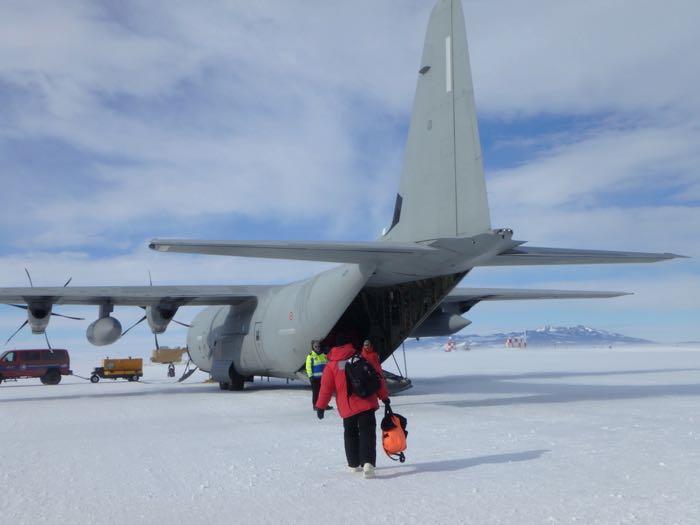 Leaving Antarctica by airplane. The Italian Air Force flew us from Phoenix Air Field in Antarctica to Christchurch, New Zealand.
Leaving Antarctica by airplane. The Italian Air Force flew us from Phoenix Air Field in Antarctica to Christchurch, New Zealand.
On my final Sunday in Antarctica, as the crew from the National Geographic program One Strange Rock showed us the final episode from their first season: "Home", the concept of home jumped to the forefront of my mind. The episode features Peggy Whitson, who has spent more time in space than any other astronaut in U.S. history! I teared up as I watched Peggy and her mom hugging after Peggy's long adventure in space. I thought about my own mom who, for the first time in my life, won't be there to greet me when I return home. (December 4th was her birthday...happy 75th mom!) As a serial wanderer, what will it be like when I return to the most stable home I've had now that my mom isn't in that home anymore? What about the other places I've called home over the years? I reflect on which ones felt the most like home and think how, in the end, I've connected to them all.
The idea of change and home makes me think about the research going on in Antarctica. I think about the way ecosystems, including those in Antarctica, are changing. I think about the research hoping to find out how those changes will affect the landscape and plants and animals that call Antarctica home. What will happen when the ocean of Antarctica warms up, even just a little? We know the temperature will change, the currents will change, the oxygen levels will change. What about the living things who depend upon the ocean? (That includes all of us, by the way)
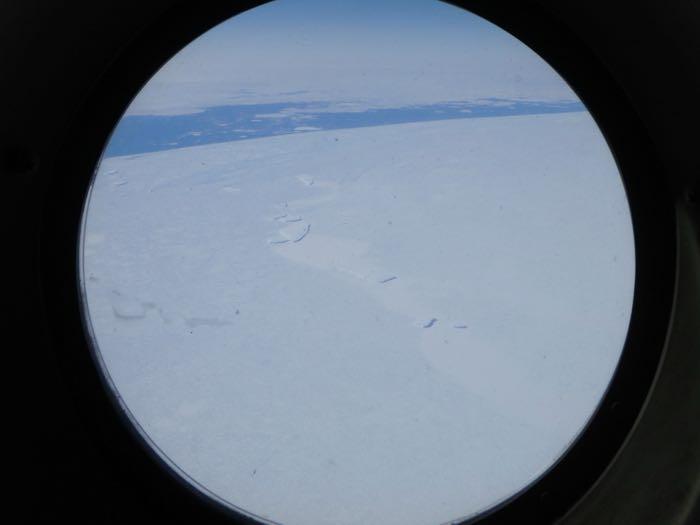 View of the sea ice and icebergs around Antarctica. Southern Ocean, Antarctica
View of the sea ice and icebergs around Antarctica. Southern Ocean, Antarctica
As our plane continued towards New Zealand suddenly the ocean began to appear. All 12 of us on the plane, who had been in Antarctica, left our seats to stare at the broken sea ice and the Southern Ocean peaking through. We saw icebergs and then the open ocean for the first time. After spending weeks standing on the ocean but only seeing it through small holes in the ice I was excited to see that big expanse of blue! It also made me wonder: What will happen to the seals and penguins and animals that live under the sea ice when the sea ice breaks up sooner in the season or doesn't form at all? I feel fortunate that I am a human who has the ability to move around and that I am a human privileged enough to be able to move from place to place.
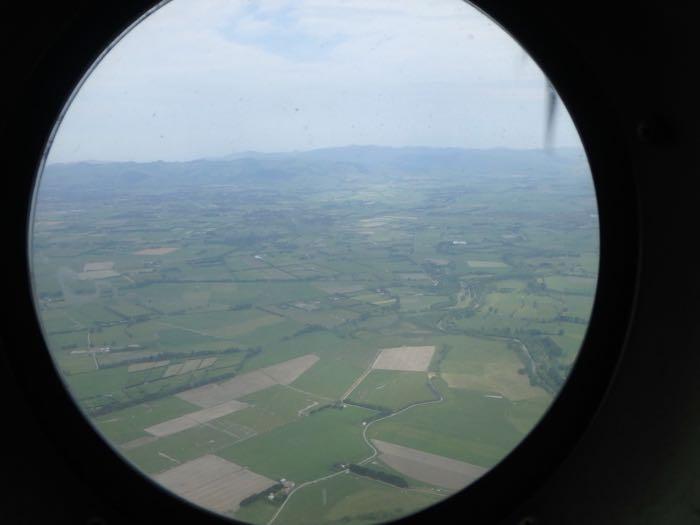 First sighting of green trees and grass! Christchurch, New Zealand
First sighting of green trees and grass! Christchurch, New Zealand
As my plane from Antarctica touched down in New Zealand I stepped off to the comfort of trees, flowers, the pacific ocean and surfing, mountains and waterfalls and, for a moment, felt quite at home. I really loved being in the cold and ice of Antarctica and I wasn't expecting to be so excited to see all of that green again! I thought more about the One Strange Rock episode and how the astronauts' view of the earth and idea of home shifted during their time in space. The idea that this big, seemingly gigantic, sphere in space is actually quite small and amazing in the grand scheme of the universe. The earth as a whole is, in fact, our home. If we think of the entire planet as our home and all of the people, animals, and plants as part of our large earth family, then everything feels much smaller, less lonely, and means we have a greater responsibility to take care of it all, not just our little corner.
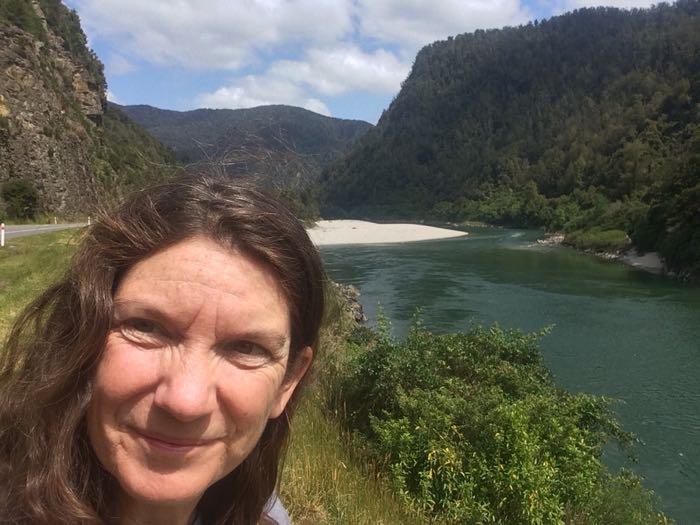 Surrounded by running water and green plants and trees in the middle of the Lower Buller, South Island, New Zealand.
Surrounded by running water and green plants and trees in the middle of the Lower Buller, South Island, New Zealand.
I've been taking the slow road back to my hometown. After leaving my temporary frozen home in Antarctica I spent some time in New Zealand before making my way to California. In each place I've been trying to view the world through this new lens that all of it is home. With this mindset I am struck by all of the beauty and wonder that the world provides and am reminded of a poem by Joe Miller
If the earth were only
a few feet in diameter, floating
a few feet above a field somewhere,
its people would come from everywhere to
marvel at it. The people would walk around it,
marveling at its big pools of water, its little pools
and the water flowing between the pools. People would
marvel at the bumps on it, and the holes in it, and they
would marvel at the very thin layer of gas surrounding it and
the water suspended in the gas. The people would marvel at
the creatures walking around the surface of the ball, and at
all the creatures in the water. The people would declare it
precious because it was the only one, and they would protect
it so that it would not be hurt. The ball would be the
greatest wonder known, and the people would come to
behold it, to be healed, to gain knowledge, to know
beauty and to wonder how it could be. The people
would love it, and defend it with their lives,
because they would somehow know that their
lives, their own roundness, could be
nothing without it. If the earth
were only a few feet in
diameter.
— Joe Miller
I love thinking of the planet as a small wonderous village. In the face of change, the "Home" episode of One Strange Rock had a message that is good for all of us to remember. Home is earth. This big, mostly blue, sphere spinning through space with all of us on it is our home. My mom taught me to be a wanderer, to find wonder and awe in the world around me, and to connect with other places and people who call this big spinning ball home. If we can all do this, and get curious about our whole planet, I think we will find connections we never would have imagined. Look carefully, read, explore, discover, connect! With connection comes caring about and taking action to protect something larger than ourselves.
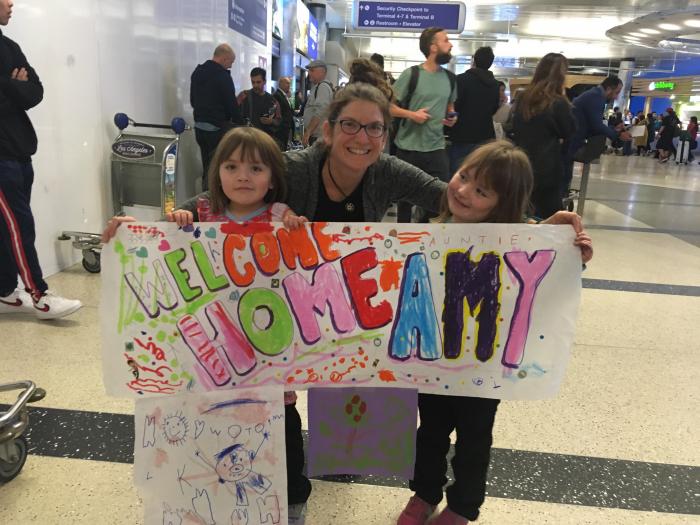 Amy Osborne's 4 year old friends, Katherine and Julianne Azbill, greet her at the Los Angeles airport! Los Angeles, California. Photo by Malora Guerrero
Amy Osborne's 4 year old friends, Katherine and Julianne Azbill, greet her at the Los Angeles airport! Los Angeles, California. Photo by Malora Guerrero
When I finally made my way back to California, I was happy to step off of the plane and see my friends and to, eventually, hug my dad. I was greeted with the warmest welcome by little hugs and laughter, playing in the park, and talking to some preschoolers about my great adventures.
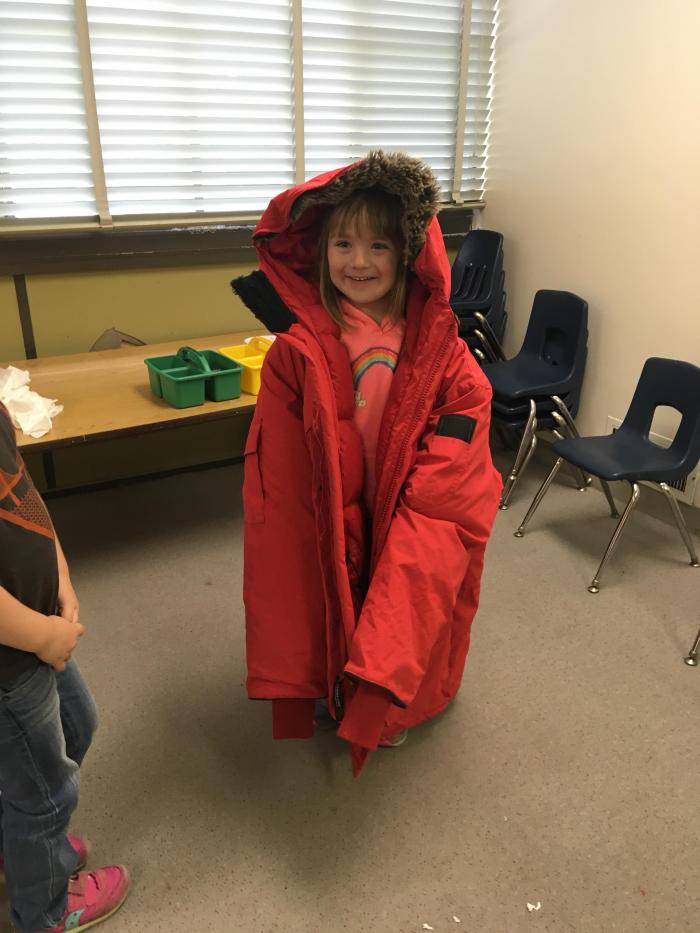 Katherine Azbill tries on the Big Red United States Antarctica program parka at her nursery school. Crescenta-Cañada Nursery School, La Cañada, California
Katherine Azbill tries on the Big Red United States Antarctica program parka at her nursery school. Crescenta-Cañada Nursery School, La Cañada, California
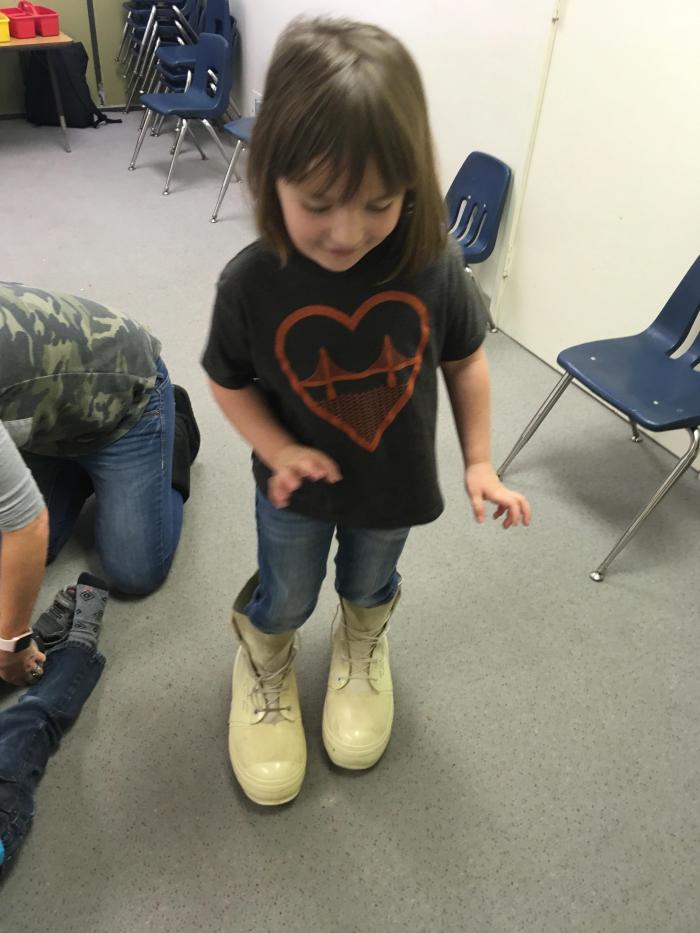 Julianne Azbill tries on Antarctic bunny boots at her nursery school. Crescenta-Cañada Nursery School, La Cañada, California
Julianne Azbill tries on Antarctic bunny boots at her nursery school. Crescenta-Cañada Nursery School, La Cañada, California
WHAT'S NEXT
I'm excited to share my expedition to Antarctica with more people and help them discover the science, beauty, and wonder of my temporary cold home. No matter where you are in the world, reach out. If I can, I'm happy to come to your school or organization or just hang out with you and tell you my story first-hand. I'm excited to return to NatureBridge in January and share all I've learned about research and marine science with my ocean family of outdoor educators and the students who attend NatureBridge programming.
Also, soon I'll be sharing some lessons for K-12 classrooms based on my expedition and I'll continue to stay in touch with the amazing research team of Dr. Amy Moran, Aaron Toh, and Graham Lobert. They're still in Antarctica and will be back on the icy continent next season to find out more about marine ectotherms and the impact of the changes these animals will be facing. You can stay up-to-date on their expedition by going to their webpage Invertebrates in the Antarctic: Metabolism, Development, Biomechanics, and Polar Gigantism
Thanks everyone for tuning in here! I hope to connect with all of you soon. Feel free to ask any final questions or make any comments you have here in the comments section. Stay curious and keep exploring our big spherical home.


Comments
Add new comment